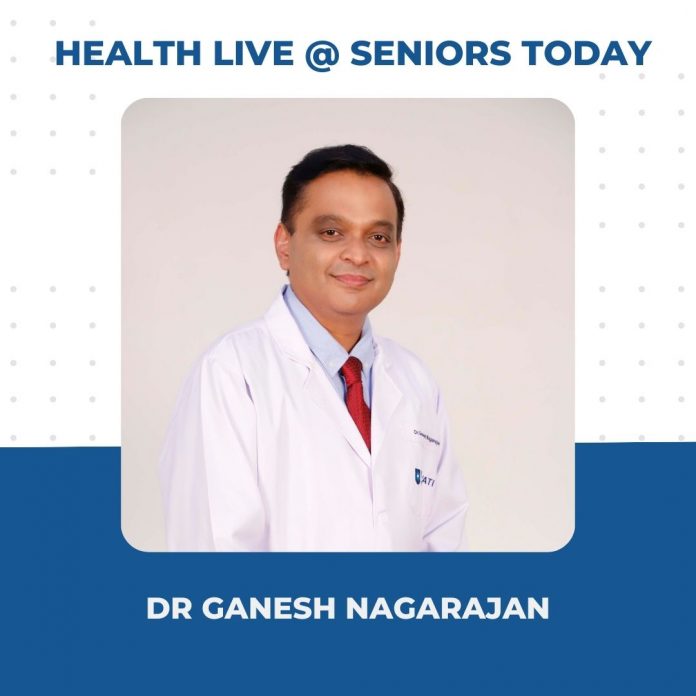On January 22, 2022, Seniors Today hosted its weekly Health Live Webinar. This week our esteemed guest was Dr Ganesh Nagarajan, Director, Hepatobilliary Pancreatic and Gastrointestinal at Nanavati Max Super Speciality Hospital Mumbai. He spoke on and answered questions about Senior Oncological Surgery, liver and gastric cancer and care.
Dr Ganesh Nagarajan is Director, Hepatobilliary Pancreatic and Gastrointestinal at the Nanavati Max Super Speciality Hospital Mumbai. With two decades experience, •as Consultant Surgeon at the PD Hinduja National Hospital, Mahim & Khar for eight years and before that Consultant Surgical Oncologist and Liver Transplant surgeon at Bombay Hospital and Fortis Hospital (2009-13). An award winning doctor, he is Fellow in Hepatobiliary Pancreatic Surgery and Liver transplantation at Hospital Beaujon, Clichy, France.
His areas of specialisations include surgeries for cancers of liver, bile duct and gallbladder, pancreatic resections for pancreatic cancer, Colorectal, stomach, oesophageal and intestinal cancer, Neuroendocrine tumours, Abdominal sarcomas, retroperitoneal tumours, Vascular resections and reconstructions in HPB tumours Multiorgan resections, HIPEC Surgery, Surgery for portal hypertension and bile duct stricture/injury
He is a member of the International Hepato-Pancreato-Biliary Association (IHPBA), the Association of Medical Consultants (AMC) and the Association of Surgeons of India (ASI).
When we talk about liver cancer, we’re talking about
Primary tumours- tumours that arose from the liver
Secondary tumours- tumours that arise from other parts of the body but go to the liver.
The most common type of tumour that we see in the liver is the HCC (HepatoCellular Carcinoma). It is a primary tumour of the liver. Most of the HCCs are due to viral hepatitis B and C.
HCC comes in the background of an abnormal/ cirrhotic liver- this is seen in almost 80% of the cases.
We now have vaccines available against Hep B and have drugs available for treatment against Hep C as well. Thus, Dr Ganesh says that we might see a drop in the number of Hep B and C cases over the next 1-2 decades.
Due to obesity and long standing diabetes mellitus we are seeing a lot of tumours in the liver, primary tumours and HCC in the background of Non Alcoholic Steatohepatitis.
Sometimes these tumours spread and they spread to other organs.
We now have special medicines available which are available in the form of targeted therapy. They have shown mixed results and many of them hold great promise.
Immunotherapy is also coming up in a big way as a treatment modality.
Tumour metastasis means that there is a tumour somewhere else and it has then spread to the liver. It can spread from colonic cancer or rectal cancer or any other abdominal cancer can spread to the liver.
But what are highly treatable are the colorectal cancers which spread to the liver.
A lot of patients with chronic H. pylori infections are prone to getting gastric cancers. And H. pylori is very common in India. And is seen more in the lower socioeconomic strata of the society. These cause distal gastric cancer.
An unexplained loss of weight, loss of appetite, a drop in the haemoglobin- are some of the signs and symptoms of gastric cancer.
Some can present as vomiting, severe acidity.
The best way to diagnose gastric cancer is to do an upper GI endoscopy and to take pieces for biopsy. We can also do a CT scan or a PET scan to stage the cancer.
Often, a laparoscopy is done to stage the cancer.
These patients often require surgery; with or without a combination of chemotherapy or radiation.
A yearly follow up or check up is encouraged. Though it is said that you are cancer free or cured if there isn’t anything suspicious that shows up in 5 years. But it is still encouraged that you go for a checkup every year to rule out a relapse.
IBS is a very complicated disease which has multiple factors which include diet, stress and anxiety, psychological factors, age related. Often in patients with IBS it is observed that despite years of combination of lifestyle modifications and medications, there is no permanent relief in symptoms. So if you’ve found something that does work for you, continue to do it/ take it.
Per se, Covid-19 has no impact on cancer. What it can do,is collateral damage. These patients may take longer to recover, have a more severe disease. And if the individual is suffering from lung issues, the chemotherapy can get delayed and the cancer can progress. It affects the dynamics of cancer treatment.








